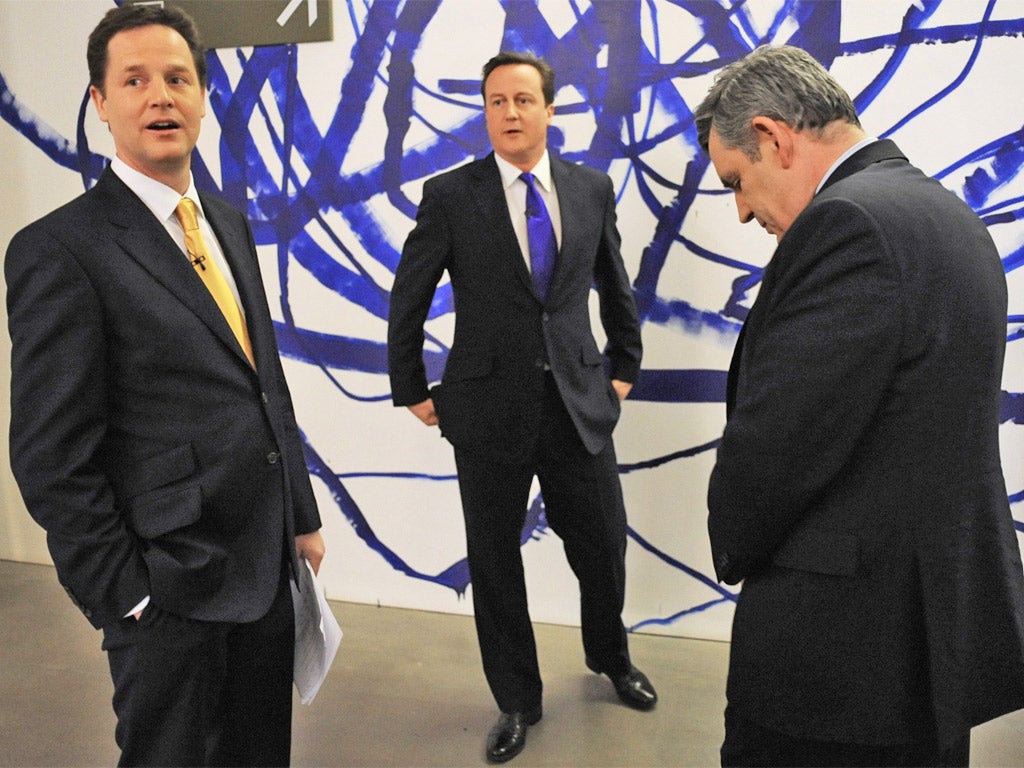Why David Cameron doesn't want live television debates in 2015
They may have stopped the Tories gaining a majority in 2010; but the British public would be best served by their return in the next electoral cycle

Your support helps us to tell the story
From reproductive rights to climate change to Big Tech, The Independent is on the ground when the story is developing. Whether it's investigating the financials of Elon Musk's pro-Trump PAC or producing our latest documentary, 'The A Word', which shines a light on the American women fighting for reproductive rights, we know how important it is to parse out the facts from the messaging.
At such a critical moment in US history, we need reporters on the ground. Your donation allows us to keep sending journalists to speak to both sides of the story.
The Independent is trusted by Americans across the entire political spectrum. And unlike many other quality news outlets, we choose not to lock Americans out of our reporting and analysis with paywalls. We believe quality journalism should be available to everyone, paid for by those who can afford it.
Your support makes all the difference.David Cameron’s telegenic appearance was one of the main reasons he was chosen as Conservative leader. At the 2005 Conservative conference, the visual contrast between Cameron’s vitality and confidence and the rather grey, unkempt David Davis may have determined who became the party’s leader.
Yet while Cameron partly owed his success in 2005 to TV, it may also have been the cause of his failure in 2010. A desire to expose the worst side of Gordon Brown may have influenced Cameron agreeing to TV debates; but he reckoned without ‘Clegg-mania’. While the Lib Dems actually lost five seats in 2010, they gained almost a million votes. The damage this did to Cameron’s hopes of gaining an overall majority is showed by the fact that the Conservatives came second in 38 of the Lib Dems’ 57 seats.
So it is easy to see why Cameron is expressing reservations about TV debates in 2015. His comments that the debates “did take all the life out of the campaign” suggest that he wants the debates to have less importance than in 2010. A likely possibility is that this would lead to him pushing for the debates to be spread out over a much longer period.
This is not completely without merit. It is true that the three weeks before the 2010 election were defined by the three debates. But suggestions that debates begin several months before polling day are misguided. That would be too early for the public to be truly engaged, and would also risk moving the country in the direction of an American-style “permanent campaign” – at the expense of the Prime Minister actually doing his job. A sensible compromise would be to have the debates say five, three and two weeks before election day, making the campaign less monopolised by them.
Reach out
TV debates have no shortage of flaws. Rules are invariably too limited and rigid, and should be loosened up before 2015. They accentuate the importance of looking good and issues not touched upon in debates risk being completely neglected. But fundamentally they provide 270 minutes for voters to assess all the main candidates, unfiltered by the media. Yes, they may contain too many soundbites. But, without them, most voters would be limited to hearing 20-second clips of speeches on the news.
In an era when politicians are all agreed that they need to do more to engage voters, it seems perverse to eschew a guaranteed way of getting the electorate to discuss politics in some sort of constructive way. Electoral turnout rose 4 per cent in 2010, despite the damage done by the expenses scandal to the public’s regard for politicians.
It is not inevitable we will see TV debates in 2015. America’s debates have long become an integral part of the US political campaign, but there was a 16-year gap between the first and second debates. However, with both Labour and the Lib Dems strongly supportive of the idea, Cameron would risk accusations of cowardice if he was seen as responsible for scuppering debates.
TV debates - rather like most aspects of democracy - are imperfect. Yet the British public will be best served if they return in 2015.
Join our commenting forum
Join thought-provoking conversations, follow other Independent readers and see their replies
Comments